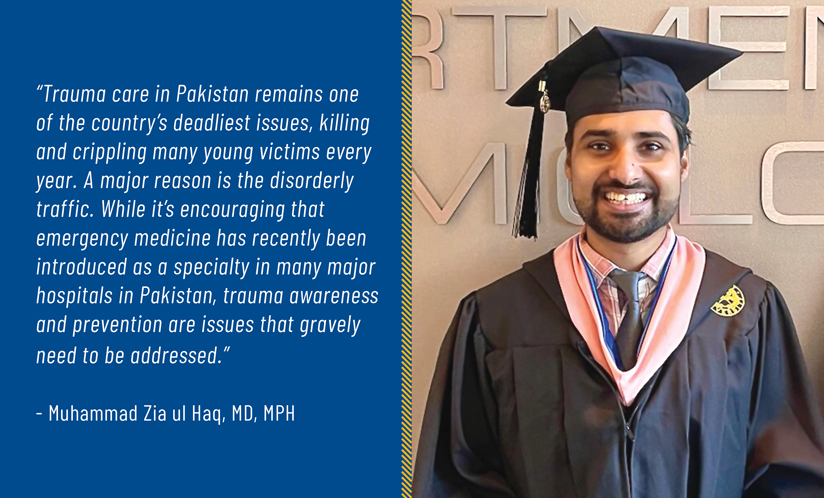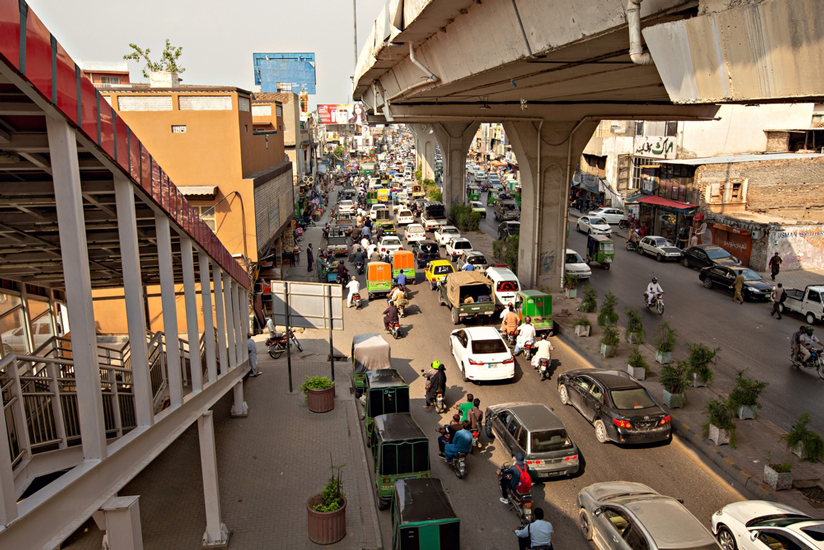Emory-Developed App Provides Life-Saving Trauma Advice to People in Pakistan

Personal experience has proven a powerful catalyst for Muhammad Zia ul Haq, MD, MPH, and his work to improve access to emergency care in his home country of Pakistan. During his second year of medical school, his sister permanently lost vision in her left eye when a car struck her in traffic. Later, Zia (which is how his friends know him), got to see the impacts of Pakistan’s terrible traffic issues—and limited emergency trauma infrastructure—firsthand while interning in the neurotrauma unit at Nishtar Hospital Multan. “We received a huge volume of young patients who had stark perspectives,” he says. “It inspired me to steer my career more toward preventing trauma versus responding to it.”
Zia applied for and was accepted into the Fulbright Scholarship Program and pursued his master of public health (MPH) at Rollins to gain knowledge in public health. Unfortunately, while he was searching for an applied practice experience during his first year of the MPH program, he learned the sobering news that one his former classmates from medical school had died in a traffic accident. “It was shocking. She was driving back home from a far-off area where she had been serving all night as a doctor,” says Zia. “It happened at a time when all of us were struggling to make a mark in the world through refining our medical and public health skills. It was such a huge talent sadly lost to poor traffic, and inspired me to contribute directly to trauma care in Pakistan.”

Zia channeled his sadness toward positive action. He began connecting with global health faculty at Emory and eventually found his way to Dr. Anna Yaffee and her team. This group had already led efforts to evaluate trauma care and training for Pakistani physicians through partnerships with The Indus Hospital, Karachi and Emory Global Health Institute and complemented the type of work Zia hoped to do.
Contributing his firsthand knowledge to the group as an investigator, Zia became engaged with the Collaborative Advanced Trauma Care project, where he directly assisted with developing and deploying an innovative new Prehospital Transport to Hospital (PATH) smartphone app. The prototype Android app became available for download in December 2021, with a version planned for the Apple store in the next phase of the project. The app, specifically designed for people in Pakistan, helps patients locate the nearest emergency facilities and self-educate with emergency trauma care to save more lives and improve health outcomes.
“This will establish a mobile-application-based prehospital communication, transport, and guidance system between bystanders, prehospital care providers (ambulance service), and emergency departments in order to improve field-based trauma care, transport to the appropriate referral network hospital, and hand off and preparation for in-hospital providers,” says Zia.
Users of the app involved in an accident—either as a bystander or victim—fill out an online live questionnaire that brings up relevant information regarding the best next trauma care steps explained with pictures and plain language, while also collecting patient data. Then, the app provides navigational information (provided via Google Maps) to the nearest hospital where beds and facilities are available. A website version is also available for people who don’t want to download the app, or for collaborators interested in learning more about the project.
“In the app’s current stage, we have two major hospital networks in Karachi in our network, The Indus Hospital and Jinnah Postgraduate Medical Centre. We are working on collaborating with more hospitals to make a more centralized trauma care [network] in Pakistan,” Zia says, noting that the team is working to add local languages like Urdu, Saraiki, and Punjabi to the app soon.
Pakistan faces a particular mortality burden as it relates to traffic incidents and gaps in available trauma care. Recent surveys have shown that trauma is a leading cause of morbidity and mortality in Pakistan, particularly among young males. A 2020 study published in Pakistan Journal of Medical Sciences, of which Yaffee was a co-author, provides context for the issue. The study examined 972 trauma patients presenting to The Indus Hospital from July 2017 to June 2018, and found that 78 percent of the patients were victims of traffic accidents (falls were the second leading cause). Out of all of the patients studied, none received pre-hospital emergency medical services, which, if administered, may have saved lives and lessened the severity of injuries if patients had received care during that first hour of trauma.
Zia saw this reflected real-time during his days working in Nishtar’s trauma unit. “I learned the important lesson that time is of the essence for patients of trauma. For example, a lot of victims of road accidents commonly present with an extradural hematoma which is a collection of blood between the skull and outermost protective layer of the brain,” he says. “If the patient is not assessed and provided the right care—which often involves draining the blood clot surgically—it can lead to sudden death due to compression of other brain structures. But, unfortunately there are no resources available in the country in case of a trauma and oftentimes quacks and unskilled people provide the wrong advice on the spot. Ultimately, we want to make this project global with collaborations from health organizations and trauma care physicians worldwide,” he says.
Zia hopes the PATH app can help save lives by providing on-the-spot trauma educational information while getting patients to hospitals as quickly as possible. “Trauma care in Pakistan remains one of the country’s deadliest issues, killing and crippling many young victims every year. A major reason is the disorderly traffic. While it’s encouraging that emergency medicine has recently been introduced as a specialty in many major hospitals in Pakistan, trauma awareness and prevention are issues that gravely need to be addressed.”
Now an alumnus of Rollins (he received his MPH in epidemiology and certificate in genetics and molecular epidemiology in fall 2021), Zia is currently back in Pakistan and will soon begin a position as an ORISE Fellow in the CDC’s Division of Laboratory Systems, where he will assist in addressing diagnostic errors through laboratory systems and work to improve diagnostic excellence.